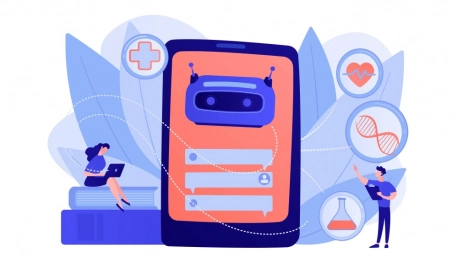Digital transformation is happening everywhere today and the healthcare industry is no exception. IoT devices, wearables, telehealth, machine learning, and artificial intelligence (AI) are starting to gain traction in the healthcare ecosystem and support an overwhelmed industry.
One AI-based technology that is set to revolutionize the way healthcare is delivered is chatbots.
According to Grand View Research, “The global chatbot market is expected to reach USD 1.25 billion by 2025, growing at a CAGR of 24.3%, according to a new report by Grand View Research, Inc. Most companies prefer in-built chatbots on their websites as they facilitate enterprises in providing instant customer interaction.”
Medical bots have plenty of use cases already and seem to be an essential part of the future of healthcare. This article highlights some key benefits provided by healthcare chatbots and outlines three such technologies that are already leveraged in the medical world.
What are the benefits of healthcare chatbots?
- Some chatbots are used for informative purposes. Today, patients require more information about their conditions, treatments, or prescription drugs. Medical bots are already proving to be extremely helpful on this matter, especially in the current medical climate.
- Leveraging these AI-based tools can help with reducing healthcare professionals’ workload. As many healthcare professionals have been overwhelmed since the beginning of the pandemic, diminishing hospital visits and eliminating unnecessary procedures is very helpful. Medical bots can provide initial assistance over one-on-one conversations and reduce the time spent by doctors and nurses for these consultations.
- The use of medical chatbots is making telehealth delivery more efficient, faster, and more streamlined. Patients can access reliable medical services in just a few clicks and without having to travel to a healthcare facility.
- Healthcare organizations have managed to cut costs and spend less money on unnecessary tests and procedures by leveraging the power of medical chatbots.
“ For AI to add the most value and for patients and physicians to embrace it, it needs to support, not supplant, the patient-physician relationship … AI will be most effective when it enhances physicians’ ability to focus their full attention on the patient by shifting the physicians’ responsibilities away from transactional tasks toward personalized care that lies at the heart of human healing.” — Steven Lin, clinical assistant professor of medicine and vice chief for technology innovation at Stanford University.
What are the most popular medical chatbots nowadays?
SafedrugBot is a virtual assistant that helps doctors in their everyday practices. This AI-powered tool focuses on breastfeeding mothers and supports doctors with valuable insights and advice related to breastfeeding.
SafedrugBot also provides accessible drug information that guides healthcare providers to safely work with pregnant and breastfeeding women.
It’s important to mention that SafedrugBot should be used only by people with medical training.
Another popular healthcare bot is Florence, who works as a virtual nurse and it can perform several tasks:
- Reminds patients to take their medicines on time
- Tracks patient’s health parameters, menstrual cycle, etc.
- Finds the nearest medical facilities for patients
Founded in 2013, Babilon Health provides consultations based on the patients’ medical history and common medical knowledge. The app uses speech recognition and extracts its knowledge from a database containing information about illnesses.
Are there any risks when using medical chatbots?
There is a lot of responsibility in the whole healthcare ecosystem. While medical chatbots are still a new technology, it’s important that healthcare providers implement healthcare data safety measures that protect patient’s privacy.
As the digital environment is expanding, the cybersecurity landscape is assaulted by increasingly complex threats. The healthcare industry can’t afford to fail to protect its patient’s data and for now, medical chatbots might represent a risk, if not managed safely and efficiently.
“AI is only as good as the humans programming it and the system in which it operates. If we are not careful, AI could not make healthcare better, but instead unintentionally exacerbate many of the worst aspects of our current healthcare system.” — Bob Kocher, MD, adjunct professor at the Stanford University School of Medicine.









